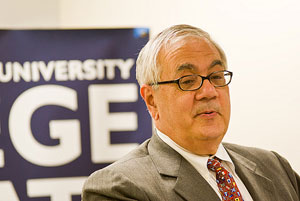David Rogers’ Politico article on the negotiations surrounding Congressional authorization of over $100 billion in war funding is a must-read. Rogers confirms what many already suspected: President Barack Obama seems truly committed to his refusal to release detainee abuse photos. House liberals had revolted against the war funding bill because 1) it was a war funding bill and 2) it included the awful Joe Lieberman-Lindsey Graham amendment retroactively eliminating detainee abuse photos from Freedom of Information Act review. Liberals were able to force the elimination of the Lieberman/Graham amendment from the final bill, but that now appears to have been a pyrrhic victory.
The conference (the meeting that reconciles the House and Senate versions of a bill) on the war funding bill was contentious. According to Rogers, Obama had to write a letter promising to do everything he could to keep the photos from being released in order to get Senate conferees to agree to the final version of the bill:
[T]he letter was significant at two levels. First, it marked the clearest statement yet by the White House recognizing the political problems posed by the Senate amendment — and the threat to the bill. Second, Obama left open the option that he could use his executive power to classify the photos as secret if things go badly for him in the courts.
In the letter, Obama begins by restating his opposition to the release of the photos, saying it won’t add “any additional benefit to our understanding of what happened in the past and the most direct consequence of releasing them would be to further inflame anti-American opinion and to put our troops in greater danger.”
In dealing with the fallout from the House liberals’ rejection of the Lieberman-Graham amendment, Obama has painted himself into a corner. Back when he first changed course on the photos, some observers speculated that he expected to lose to the ACLU in court and knew he would have to release the photos anyway—he didn’t really want to release the photos, he was just earning some easy points from the right. Now it appears clear that he is willing to fight hard to defend a position that he didn’t originally support. By classifying the photos as secret—using executive power and secrecy to negate court rulings he didn’t like—Obama would be emulating the worst behavior of Dick Cheney and others in the Bush administration. That would be the firmest proof yet that all Obama’s talk about transparency was just that—talk.
I should also note that Obama’s argument against releasing the photos is total poppycock. It should be totally non-controversial that additional photos will add to our understanding of what happened in the past. There’s a reason the CIA destroyed the interrogation video tapes: images convey a different kind of truth than words do. It’s one thing to read that Americans abused detainees, not just in Abu Ghraib, but throughout the world, encouraged by the highest levels of government. It’s another thing entirely to see the photographic evidence of that abuse. The second part of the White House’s argument is equally silly, because it can be extended ad infinitum. Are we supposed to keep secret anything that makes the US look bad? If Obama does decide to pull a Cheney and classify the photos as secret, he better get ready for a long slide down a slippery slope. What happens the next time there’s something that embarasses the US and might inflame opinion against Americans? Will he classify that, too?
Update: It looks like Glenn Greenwald is making this same argument. Maybe that’s because the administration’s position is so transparently ridiculous.
Late Update: Kevin Drum responds.






